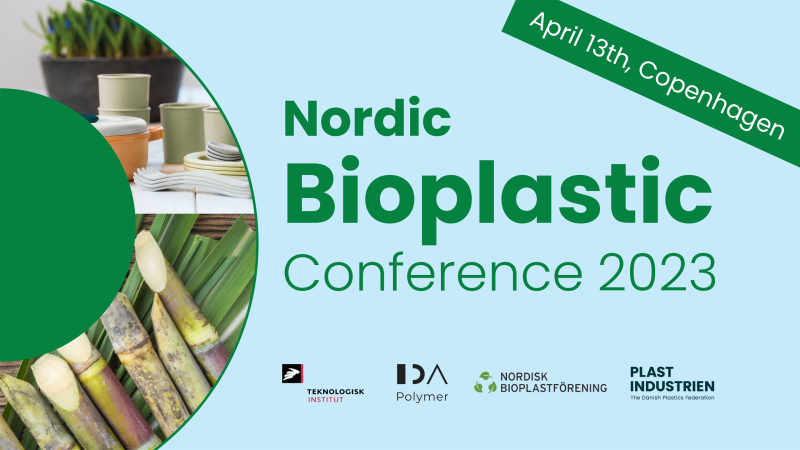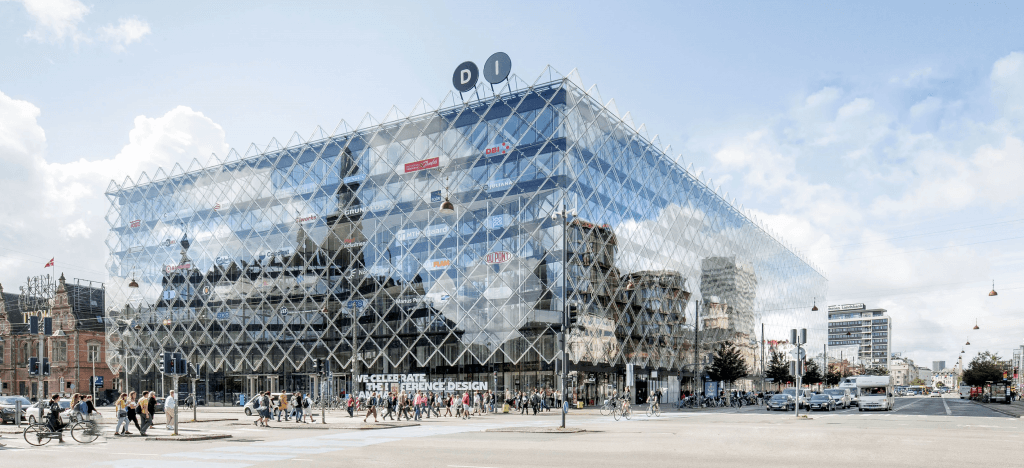Nordic Bioplastic Conference 2023 April 13th

On April 13th in Copenhagen, the Nordic Bioplastic Conference 2023 will showcase the latest innovations in biobased and biodegradable plastics. An extensive program provides the opportunity to explore the possibilities within this diverse set of materials.
This event is over but you can find presentations and pictures her.
Materials selection, recycling, and disposal of products are key factors when planning for sustainability.
An option to consider is biobased plastics, which are plastic materials made from renewable sources. Similarly, biodegradable plastic, which is plastic that degrades into naturally compatible substances, might be a way to reduce pollution from plastic that cannot be collected for recycling.
The Nordic Bioplastic Conference 2023 will bring together experts from the entire bioplastics value chain to update the industry on developments within the field. In addition to industry case studies and market and application overviews, the event will also feature input from experts, policymakers, and consultants.
There is a diverse lineup of national and international speakers at this year’s Bioplastic Conference, including representatives from the EU – Directorate-General for Environment, The Danish Environmental Agency, feedstock- and raw material suppliers, plastic converters, brand owners, certification bodies, and organizations.
Updates on trends and two themes:
The program aims to update the guests on broad trends and new materials but this year the Planning Committee has also selected two themes for further detailing:
Theme 1: Mass balance
The mass balance principle allows for a step-by-step transition to using recycled and/or renewable feedstock, which is crucial to phasing out fossil raw materials on a large scale.
How do you define mass balance?
With mass balance, fossil, and recyclable or renewable substances are mixed into existing systems and processes while keeping track of their quantities and allocating them accordingly. Although the actual carbon molecules in the product may not be recycled or renewable, a third-party certificate verifies the recycled or renewable content. As a result, we can all support sustainable sourcing of recycled and renewable raw materials and reduce greenhouse gas emissions.
In two talks, the topic of mass balancing will be explained and discussed in relation to biobased and bioderived content.
Theme 2: Biodegradability
Recently, there has been much discussion of the role of biodegradable plastics. A biodegradable plastic is a plastic that breaks up when exposed to microorganisms. It is usually made from natural byproducts and is used to reduce plastic pollution by degrading products that cannot be collected for recycling. There are also some bioplastics that are mechanically recyclable.
As part of the conference, the Danish Environmental Agency will present the results of their research on biodegradable plastic applications and elaborate on the implications for the industry.
Conference program
| Time | Topic | Presentation by |
|---|---|---|
| 08:30 – 09:30 | Breakfast and registration | |
| 09:30 – 09:35 | Welcome and introduction | Rasmus Grusgaard, Plastindustrien |
| 09:35 – 09:40 | Bioplastics explained in 5 minutes | Hans Friedsam, Nordisk Bioplastforening |
| 09:40 – 10:10 | Sustainable end of-life options for Luminy PLA illustrated with real life case studies: Examples of biodegration, composting, mechanical and chemical recycling | Francois de Bie, TotalEnergies Corbion |
| 10:10 – 10:30 | Emballator climate strategy including biobased plastics in thin wall packaging | Mats Jepsson & Maria Edqvist Schultz, Emballator |
| 10:30 – 10:50 | Amorphous PHA – the key to tuning the soil biodegradability speed of polymer compounds | Hugo A.J. Vuurens, CJ Biomaterials |
| 10:50 – 11:10 | Coffee break | |
| 11:10 – 11:30 | Mass balance in the Chemical Industry: Accounting for biobased content |
Klas Briland, BASF |
| 11:30 – 11:50 | Biopolymers: Driving Change through Collaboration | Mark Vergauwen, NatureWorks |
| 11:50 – 12:15 | How can mass balance automation and Digital Product Passports contribute into sustainability claims validation across the supply chain. | Dr. Phil Brown, Circularise |
| 12:15 – 13:15 | Lunch | |
| 13:15 – 13:40 | Mass balancing following the ISCC and REDcert schemes | Maja Henriksen, Baltic Control Certification |
| 13:40 – 14:00 | Woodly redesigning plastics – future without fossil plastics | Dr. Tommi Vuorinen, Woodly |
| 14:00 – 14:25 | The role and perspectives for Biodegradable plastics in Denmark. Main conclusions from the NIRAS report | Marianne Jakobsen Juhl, Danish Environmental Agency / NIRAS |
| 14:25 – 14:45 | 34 plastic materials with a reduced environmental impact | Erik Müller, Positive Plastics |
| 14:45 – 15:10 | Coffee break | |
| 15:10 – 15:30 | Fundamental understanding of biodegradability | Dr. Ir. Gijs Habraken, BASF |
| 15:30 – 15:50 | Standardized tests for biodegradable and compostable plastics | Nicolaj Ma, Danish Technological Institute |
| 15:50 – 16:10 | Future perspectives for using more bioplastics | Birgitte Enghave, Biobag |
| 16:10 – 16:30 | The Sustainability of Polylactic Acid (PLA) – Composting and Recycling | Søren Andreassen, Greenway Denmark |
| 16:30 – 16:35 | Conference Wrap-up | Rasmus Grusgaard, Plastindustrien |
| 16:35 – 17:00 | Networking drinks |
What is bioplastic?
The term bioplastic refers to a variety of plastic materials derived from renewable resources, are biodegradable, or both. This can lead to confusion regarding bioplastic materials.
- A biobased and biodegradable plastic is one made from renewable resources, such as biomass (corn, wheat, potatoes, etc.), and is capable of biodegrading under certain conditions. Disposable items such as packaging, drinking bottles, single-use food containers, and cutlery are often made of these materials.
- Non-biodegradable and bio-based bioplastics: These materials are also made from renewable resources, but they are more durable and have a longer life cycle, because they are designed to last longer and not degrade.
The venue
The event is held in Industriens Hus in downtown Copenhagen. The Ticket includes breakfast, lunch, coffee, and networking drinks.

Tickets
Reserve your ticket to the event here. Discouted rates for members of Plastindustrien, Nordisk Bioplastforening, IDA Polymer, ATV-SEMAPP, DI or Dansk Materiale Netværk
You can also buy tickets by using this link: Tickets
Planning committee
| Nordisk Bioplastforening | Hans Friedsam | http://www.nordiskbioplastforening.se |
| IDA Polymer | Daniela Bach | https://ida.dk/viden-og-netvaerk/netvaerk-oversigt/kemi-plast-og-materialer/ida-polymer |
| Teknologisk Institut | Natanya Majbritt Louise Hansen | www.teknologisk.dk |
| Plastindustrien i Danmark | Rasmus Grusgaard | www.plast.dk |
Why attend the conference?
-
- Attend if you want the latest updates on one of the important materials of the future.
- Attend to learn from industry cases on applications of biobased and biodegradable plastic materials
- Attend to network with professionals from the biobased economy and share your knowledge.
Contact the organizer
All inquiries regarding the conference can be made to: bioplasticconference@plast.dk
Table top exhibtion
As previous years, the conference creates space for a bioplastic-exhibition. Delegates from the industry can apply for a cafe table and bring samples, cases and a roll-up for the exhibition. Please contact bioplasticconference@plast.dk if you want to exhibit.
